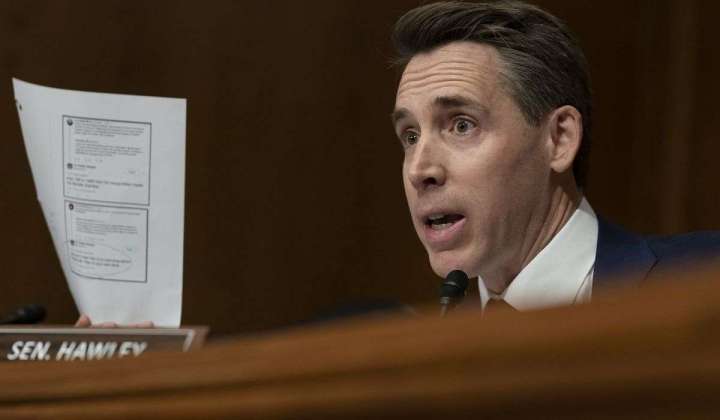Hawley wants a say in writing Capitol Hill’s new AI rules

Sen. Josh Hawley is joining the fray to author new rules for artificial intelligence from Washington, where Democrats have taken a lead role.
As President Biden’s White House formulates a new National AI Strategy, Senate Democrats led by Majority Leader Charles E. Schumer are moving toward legislation to govern AI. Mr. Hawley, Missouri Republican, doesn’t want to be left out and is pushing guidelines he wants any future AI legislation to follow.
“Congress can and should act to protect Americans’ privacy, stave off the harms of unchecked AI development, insulate kids from harmful impacts and keep this valuable technology out of the hands of our adversaries,” Mr. Hawley said in a statement Wednesday.
Mr. Hawley said he wants any forthcoming AI legislation to let people sue companies for harm caused by AI, force companies to impose age limits blocking children’s usage, block the import and export of AI tech with China, protect personal data and establish a licensing system for those working on new AI tools.
Mr. Hawley is a member of the Senate Judiciary Committee, a hub of activity on AI legislation. He is the top-ranking Republican on the Senate Judiciary Subcommittee on Privacy, Technology and the Law, which solicited input last month from OpenAI CEO Sam Altman, whose team makes ChatGPT.
The Senate Judiciary Subcommittee on Intellectual Property held its first AI hearing Wednesday, and its top-ranking Republican, Sen. Thom Tillis of North Carolina, figures to play a major role in future AI legislation, too.
Mr. Tillis is an AI enthusiast who said he signed up fast for ChatGPT’s beta rollout and noted that he worked in the AI industry in the mid-1980s.
He said he anticipated lawmakers would need to have an “endless number of hearings” on AI to make sure they get the legislation right and portrayed himself as an optimist about the burgeoning tech.
“Everybody’s talking about all the bad things that could happen with AI — I, Robot, the zombie apocalypse — and then I’m in the good things that are going to happen category, and even if we choose not to participate as a nation, it’s going to happen,” Mr. Tillis said at Wednesday’s hearing. “So the question is whether or not the United States is going to maintain a leadership position in innovation.”
The intellectual property subcommittee examined the issue of patents and copyrightability questions surrounding AI and things generated by AI.
A Google representative testified at Wednesday’s hearing, with Big Tech wanting a say in any forthcoming AI bills. Microsoft President Brad Smith urged the federal government last month to create a new agency to implement AI rules.
If Congress does not act, the courts may serve as a lead AI policymaker by applying existing laws to resolve disputes surrounding the emerging tech. For example, a Georgia state court’s docket includes a defamation lawsuit filed this week by radio host Mark Walters against OpenAI over language allegedly generated by ChatGPT that reportedly included false claims about the broadcaster committing fraud.






